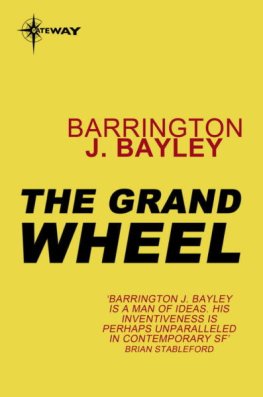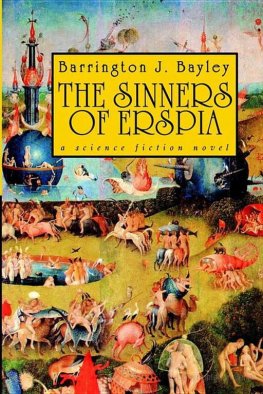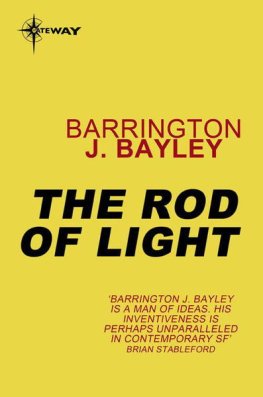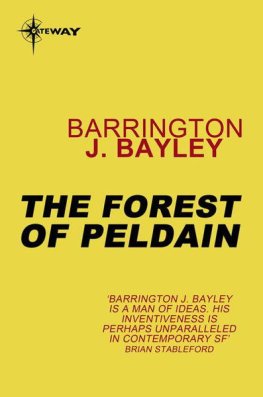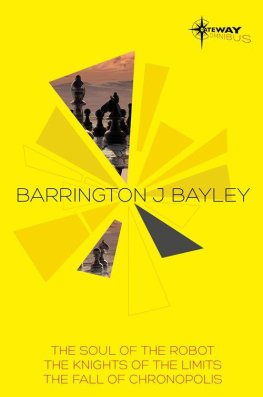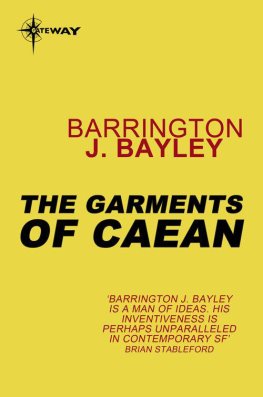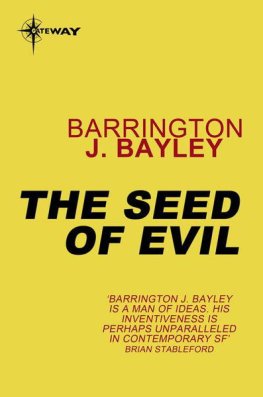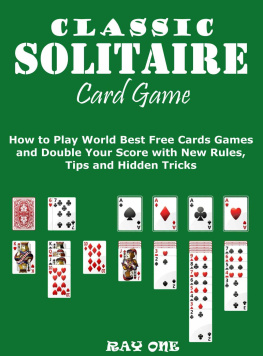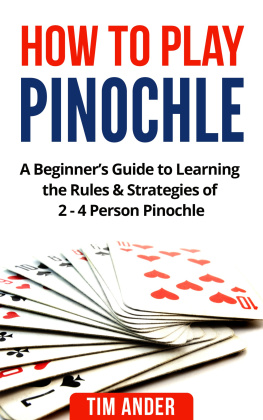Barrington J. Bayley
THE GRAND WHEEL
There was a concave stripper in the game.
Cheyne Scarne, as he shuffled the deck preparatory to dealing, covertly sized up the player sitting opposite him. The stripper who faced him over the green baize table was not much over twenty-five years of age, and with his pale face and thin nose had an icy sort of self-assurance about him. Earlier he had introduced himself as Skode Loder, from off-planet, a newcomer to Io one of the new breed of players who never stayed long in one spot.
Already Scarne had gauged Loder to be a card mechanic, but he hadnt been sure just what the particular gimmick was. Now that he held the deck in his own hands, he knew that, too.
Several of the trump cards had been finely shaved on their short edges, so that the stripper or, now that he knew the secret, Scarne himself could on his deal drop them out of the pack and distribute them whichever way he wanted. The job had been artfully performed: the slight concavities made no perceptible dent. But Scarne had found the right touch, the slight difference in pressure, that made the trick work.
Loder, he noted, wore a slim gold ring on the third finger of his left hand. That was it, of course. There was a blade vibrator in the ring.
It was too obvious. In fact, almost blatant, as if the sharp were advertising his trade. Scarne had known of stripper blades that were totally invisible, being embedded in the flesh of the finger and anchored to the bone.
Loder was gazing back at him, a sardonic smile playing on his lips. Scarne was in a dilemma. In the past hour he had been nearly cleaned out by this mechanic. He could now expose him and get his money back. But he hesitated. In too many ways, it didnt add up.
The sharp had walked into a game between professionals. For his victim he had chosen Cheyne Scarne who, as well as being an experienced gambler, was also a professor of randomatics in other words he was one of the hardest men in the solar system to take for a ride. Everything else was wrong for this situation, too. The place: not some unfranchized shack but a Wheel house, where to be caught cheating could mean being banned from every Wheel establishment in a hundred light-year radius. The game: opus, a game for professionals, one of the only two card games to utilize all seventy-eight cards of the ancient Tarot pack (the other was Kabala, a game whose rules were so abstruse only a handful of people had succeeded in mastering it).
Who would try to pull off such a stunt? Nobody but a fool. And Skode Loder was too expert to be a fool.
Another of the players spoke, good-naturedly. Eh, dont give us any riffle stack, Cheyne. Come on, deal us a fair hand.
Scarne had automatically been shuffling and re-shuffling while he thought the matter over. He glanced again at Loder. He could almost imagine that the man knew and was laughing at him.
He came to a decision. Squaring up the deck, he laid it in the centre of the table, then pushed his remaining chips into the stakes circle. He took out his bank card and threw that in, too.
Time for me to leave, he said. But first lets cut for whats left, Loder.
Loder bent his head to read the amount printed on the bank card. He sad stock-still for a moment. Then he shrugged.
Why not?
The others looked on with interest, making no comment, as Loder covered Scarnes stake. He cut the deck, glancing at the card he drew before laying it face down.
Scarne in turn cut, showing the card to Loder. It was the queen of wands.
Loder smiled, and revealed his card. It was the card known as the universe: a trump, one of the major arcana, the elaborate picture symbolism that had been devised in antiquity to depict cosmic mysteries. It showed a naked female dancing within an oval wreath, a flaming wand in each hand.
The card was probably stripped, Scarne thought. That just about summed up everything. A stripped universe.
There was a time-honoured losers prerogative. Scarne reached out and picked up one small chip. Okay?
Loder nodded. Scarne stood up.
Another time, perhaps.
The black-jacketed seneschal bowed to him as he emerged from the card-room.
Scarne had a reason for knuckling under to Loders depradations. There was one thrilling explanation that did make sense.
For some time he had been trying to find his way to the inside of that vast, circumspect organization known as the Grand Wheel, controllers of chance and probability, in the gaming sense, over the whole of man-inhabited space. He knew that in a less sophisticated phase of its history the Wheel had practised a rough-shod method of recruitment. It would engineer the ruin of the prospect, leaving him bankrupt, threatened with imprisonment or violence; thus he would be made to feel the Wheels power even while forced to accept its protection, caught in a closed system from which there was no escape.
These days the Wheel had no need to take such measures. But it had a well-known love of tradition. Scarne believed Loder was a Wheel operative, going through ancient motions. If Scarne had behaved like a hick, denouncing Loder and showing that he understood events only in a simplistic sense, then his opportunity would be gone; he would be deemed too inflexible. Only if he gave some sign that he recognized the hidden level in the game might there be a further contact.
It was conceivable, of course, that Loder had somehow learned of Scarnes long-term object and was perpetrating a double-bluff.
He could only wait and see.
A walk along a blue and gold corridor brought him to a balustraded balcony which overlooked the main gaming area. The tables and fermat machines were busy, bringing in the Wheel its eternal percentages. On one wall a huge number display flashed out sequences of multi-coloured digits. Over the exit glittered the Grand Wheels emblem, a slowly revolving spoked gold wheel.
The background music mingled with the calling of bets and made a meaningless din in his ears. He descended the stairway and wandered among the gaming machines. Idly he stopped at a table with a surface of coloured squares. He put Loders chip on the pale green. The table-top flickered and surged. The chip went down.
Hello, Cheyne. Anything upstairs worth getting into?
Scarne turned on hearing the voice of Gay Millman, an acquaintance. No, nothing, he said, and walked on.
Centuries ago, he reflected, an establishment like this one would have been filled with simpler mechanical devices, of which the roulette wheel, he supposed, was the archetype.
But that was before the advent of randomatics, the modern science of chance and number, had rendered all such devices obsolete. They were now regarded as primitive, almost prehistoric. Scarne could have walked into any old-style casino or gambling arcade and, armed with the randomatic equations, would have been guaranteed to win, moderately but consistently, over the space of an hour or two.
Randomatics rested on certain unexpected discoveries that had been made in the essential mystery of number. It had been discovered that, below a certain very high number, permutating a set of independent elements did not produce a sequence that was strictly random. Preferred sub-structures appeared in any chance run, and these could be predicted. Only when the number of independent elements entered the billions the so-called billion bracket did predictability vanish. This was the realm of second-order chance, distinguished from first-order chance in that it was chance in the old sense: pure probability, unadulterated by calculable runs and groupings.
The mythical system once sought by cranks and eccentrics became, therefore, a scientific fact. To meet this challenge the fermat, a new class of machine able to operate beyond the billion bracket, arose. Early versions had been comparatively crude affairs, following, perhaps, the path of a single molecule in a heated gas or counting out exploding atoms. As the randomatic equations, refined and extended, pushed back the billion bracket still further these, too, became obsolete. These days all fermats worked on the subatomic level, by manipulating the weak nuclear interaction, intercepting neutrinos, processing exotic artificial particles, or even tapping the source of true randomness below the quantum level. The innards of some of them were Wheel secrets.

